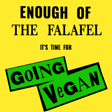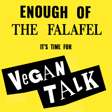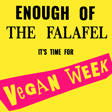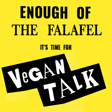
222- UK Government to end animal testing?
Well, that's perhaps what they'd have you think. But it doesn't take much digging to reveal that the champagne needs to stay on ice for quite a while, before animal advocates can truly celebrate.
And where's James Herriot when you need him?! Perhaps taking on the persona of an AI Bot, is the answer! UK Vets are concerned that AI might not be the best placed to advocate for farmed animals' welfare...either that, or they're worried that their jobs are under threat. But what do three long-in-the-tooth vegans think?!
As well as these stories, Mark, Julie & Anthony discuss five other bits of news from the vegan & animal rights space over the last seven days across the world.
****************
Enough of the Falafel is a community of people who love keeping on top of the latest news in the world of veganism & animal rights. With the Vegan Week podcast, we aim to keep listeners (& ourselves) informed & up-to-date with the latest developments that affect vegans & non-human animals; giving insight, whilst staying balanced; remaining true to our vegan ethics, whilst constantly seeking to grow & develop.
Each week we look through news stories from the past 7 days in the world of veganism & animal rights.
If you spot any news stories that might catch our fancy, or have an idea for a discussion topic, get in touch via enoughofthefalafel@gmail.com.
*******************
This week's stories:
https://animalrising.substack.com/p/one-community-versus-big-ag
https://www.fwi.co.uk/news/crime/pig-farmers-warned-over-surge-in-activist-incursions
https://www.independent.co.uk/news/uk/home-news/reindeer-christmas-events-festive-season-animal-welfare-b2863010.html
https://www.frontiersin.org/news/2025/11/11/frontiers-nutrition-plant-based-diets-reduction-carbon-emissions-land-use
https://www.farminguk.com/news/vets-warn-ai-revolution-must-not-undermine-livestock-welfare_67537.html
https://www.theanimalreader.com/2025/11/08/2900-cows-stuck-on-ship-spiridon-ii-for-over-2-months/
https://www.gov.uk/government/news/animal-testing-to-be-phased-out-faster-as-uk-unveils-roadmap-for-alternative-methods
https://www.bbc.co.uk/news/articles/cm2lpekjeg9o
https://www.peta.org.uk/blog/roadmap-end-animal-experiments-uk/
https://crueltyfreeinternational.org/latest-news-and-updates/government-launches-bold-new-plan-replace-animal-testing
https://www.humaneworld.org/en/issue/cosmetics-animal-testing-FAQ
https://en.wikipedia.org/wiki/Animal_testing_regulations
****************
Thanks everyone for listening; give us a rating and drop us a message to say "hi"; it'll make our day!
Mark, Julie & Ant



